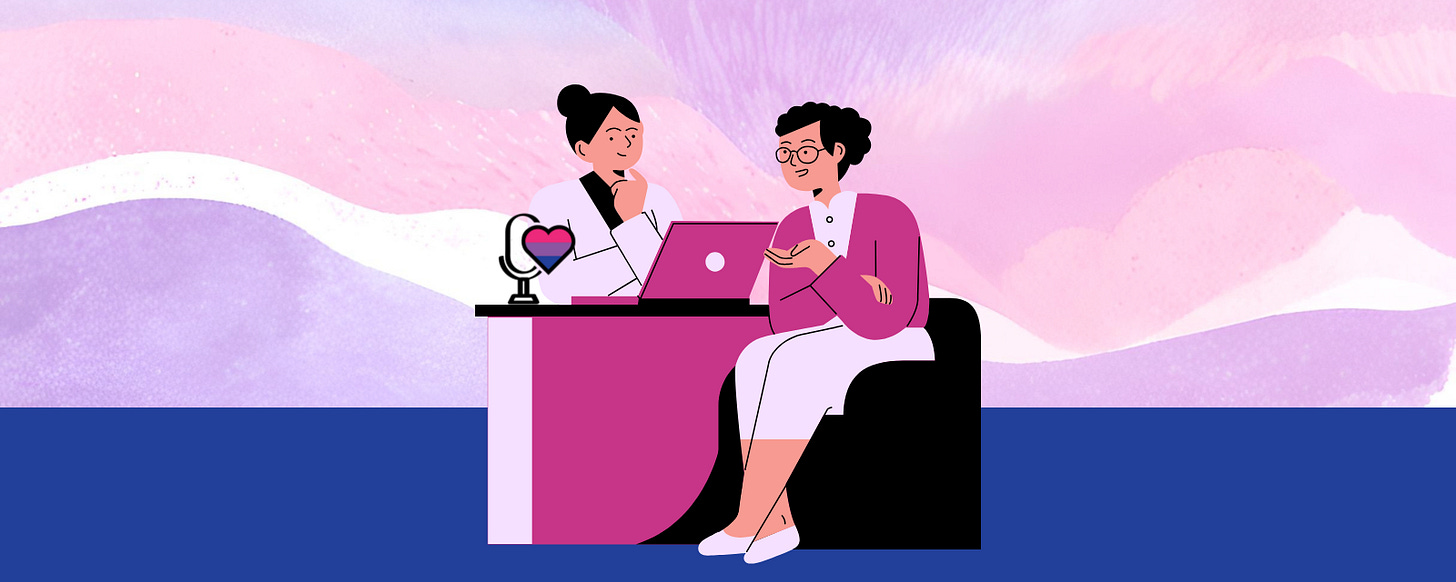Why It Matters to Come Out to Your Doctor
Happy Bisexual+ Health Awareness Month!
Maybe it’s me; maybe you’ll relate. Have you ever gone to a doctor’s appointment, looked at your intake form, and stared at the question that asks about your sexual orientation? Depending on where you live, there’s a chance you’ve never been asked this in the waiting room.
But what about relationship status? If you’re in a monogamous relationship with someone of the opposite sex, do you disclose your bi+ identity? When the doctor asks if you’re sexually active, do you clarify that your history includes more than just partners of one gender?
The question of whether or not to come out to your doctor can feel unnecessary, maybe even burdensome, especially if you don’t anticipate your sexuality having any direct impact on your immediate health concerns. But here’s the truth: it does matter.
March is Bi+ Health Awareness Month, hosted by the Bisexual Resource Center, a time to shine a light on the unique health disparities bi+ people face. Despite making up the largest portion of the LGBTQ+ community, we are often overlooked in medical research, erased in data collection, and misunderstood by healthcare providers. This erasure contributes to real harm: higher rates of mental health struggles, increased substance use, and poorer overall health outcomes compared to both straight and gay populations. A big part of that problem? Doctors don’t even realize they have bi+ patients.
And that’s where coming out, even when it feels like it shouldn’t matter, comes in.
The Data Speaks Volumes
Studies have consistently shown that bi+ individuals experience higher rates of depression, anxiety, and other mental health concerns. We’re also more likely to delay seeking medical care due to past negative experiences with healthcare providers (or because we’re broke). Many of us have faced outright discrimination, dismissal, or a complete lack of understanding from doctors who either assume we are straight or lump us in with gay and lesbian patients without acknowledging our unique needs.
As a result, bi+ people are less likely to be out to their doctors compared to gay and lesbian individuals. This isn’t surprising given the routine erasure we face in both queer and straight spaces. But when we don’t disclose our identities, it allows the cycle of invisibility to continue. When doctors aren’t aware that they have bi+ patients, they don’t seek out the education they need to provide us with better care. They don’t recognize the distinct health risks we face, and they don’t even think to ask the right questions.
The Problem With Assumptions
Let’s say you’re a bi+ cisgender woman in a monogamous relationship with a cisgender man. Your doctor assumes you’re straight and never asks about past partners of different genders, which means they might not screen you for certain STIs or consider other risk factors relevant to your health (like depression). Maybe you’re a bi+ man married to another man, and your doctor assumes you’re gay, overlooking any past relationships you’ve had with women and failing to tailor their guidance accordingly. (Don’t even get me started on how monogamy being considered the default keeps folks from being completely honest with their doctors about their sexual activity.)
These assumptions may seem harmless in the moment, but they contribute to the larger issue of medical invisibility. When bi+ patients don’t disclose their identity, it reinforces a system where doctors don’t think bi+ people exist, or at least not in numbers significant enough to warrant specialized care.
Breaking the Cycle
This may be a surprise, but coming out to your doctor isn’t just about you. Yes, it ensures that you get the best care possible, but it also signals to medical professionals that bi+ people are here and that our health matters. It challenges the assumption that sexuality is binary and encourages doctors to think more inclusively about their patients.
If you’re not sure how to bring it up, it can be as simple as mentioning it in response to intake questions or correcting a doctor’s assumption. “I’m bisexual” or “I’m pansexual” may feel like small statements, but they are revolutionary in the face of a system that so often erases us. If you’re worried about how your doctor will react, you can test the waters by asking questions: How familiar are you with LGBTQ+ health concerns? Do you have experience working with bi+ patients? Their response can give you a sense of whether this is a provider you feel safe opening up to.
Of course, not every doctor’s office feels like a safe space, and not every bi+ person is in a position where coming out feels right. That’s okay. Your safety comes first. But when we are able to come out, we make it easier for those who come after us. We help create a world where bi+ health is taken seriously, where doctors recognize our existence without us having to fight for it, and where the next generation of bi+ patients doesn’t have to question whether their identity is relevant to their care because their doctors already know that it is.
This Bi+ Health Awareness Month, let’s challenge ourselves to break the cycle of invisibility. If you feel comfortable, consider coming out to your doctor. If that’s not feasible, advocate in other ways by supporting bi+ health research, pushing for inclusive medical education, or simply having these conversations with friends and family.
Every act of visibility moves us forward.
Stay healthy,
Bailey



